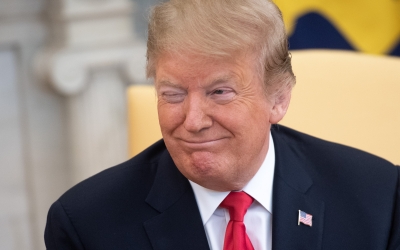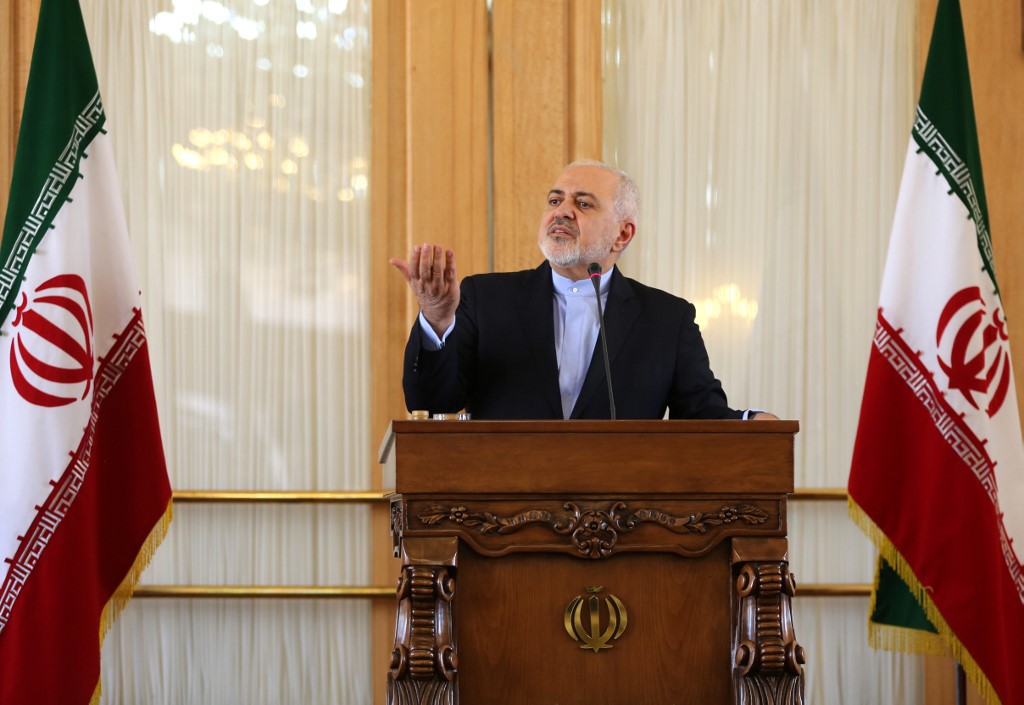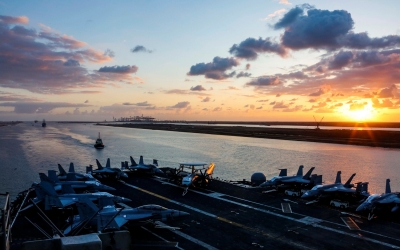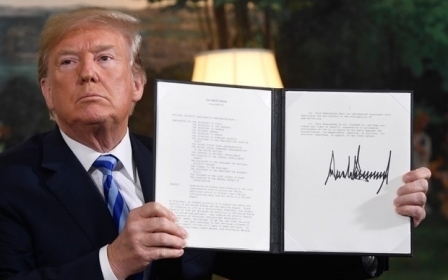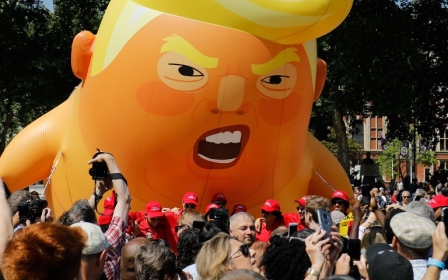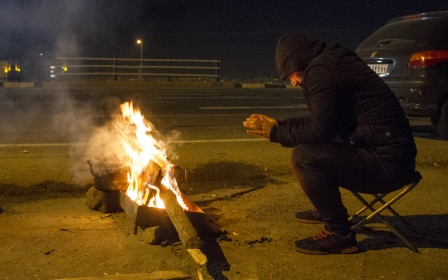Why an imminent war with Iran is not in Trump’s interests
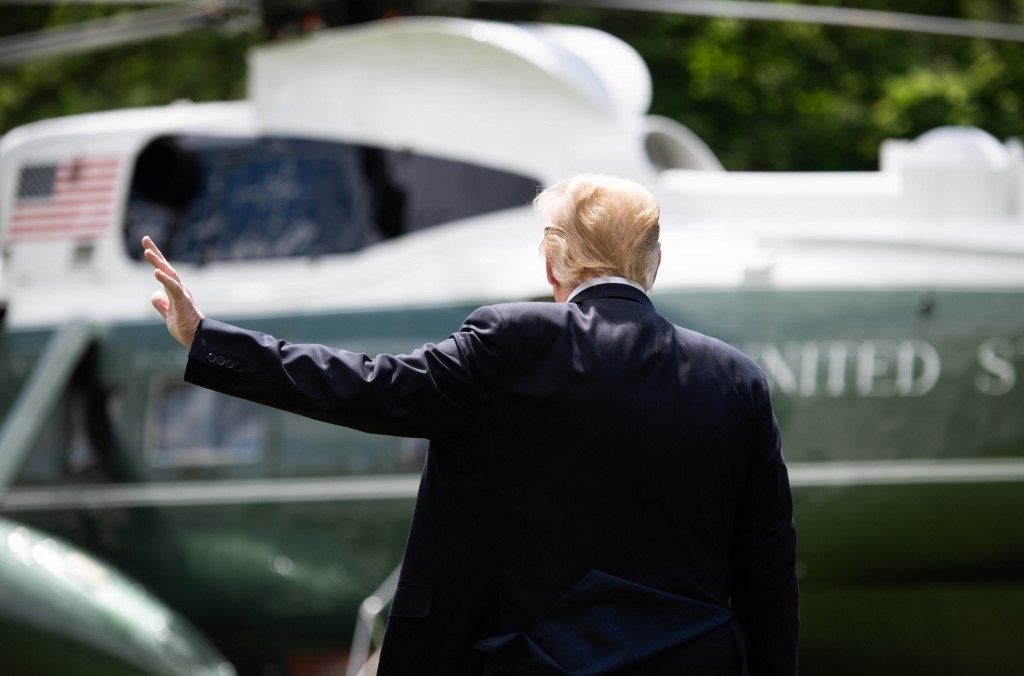
Sometimes you have to listen hard to Donald Trump to find out what he really wants to say. Last week, the US president buried an invitation to Iran to come and talk to him under piles of bile about John Kerry, the former secretary of state, and his contacts with Tehran.
But what Trump was really saying had nothing to do with the Democrat who negotiated the now-moribund Iran nuclear deal.
Confirmation of this came from a senior Iraqi source in Baghdad with knowledge of the meeting that took place between US Secretary of State Mike Pompeo and Iraqi Prime Minister Adel Abdul Mahdi last week.
A show of force
Pompeo’s visit was not announced before it happened. Abdul Mahdi was expecting the US secretary of state to breathe fire over Iran, after the news that Washington had sent an aircraft carrier and B-52 bombers to the Gulf in a show of force.
Pompeo was expected to demand the withdrawal of pro-Iranian militias who could attack US troops stationed in Iraq in a time of war.
Pompeo asked Abdul Mahdi to pass the message to Tehran that the US was not keen on a war
Not of a bit of it. What Pompeo actually told Abdul Mahdi, according to the source with knowledge of the meeting, was quite different, and Pompeo’s tone surprised the Iraqi prime minister.
Pompeo asked Abdul Mahdi to pass the message to Tehran that the US was not keen on a war and that all Trump wanted was a new nuclear agreement - one that he could call his own.
“Pompeo said the US is keen on a new agreement. Abdul Mahdi replied that the Iranians are a proud people and they will not reopen the nuclear deal. But he suggested that Iran could be open to an added protocol,” the source told MEE, noting Pompeo replied that an added protocol could be “a good idea”.
“Pompeo’s tone was positive. He did not threaten Iran. The next day, Abdul Mahdi sent an envoy to Iran to inform them of the offer,” the source said.
At around the same time, Trump said something similar in his public diatribe against Kerry.
“What they should be doing is calling me up, sitting down and we can make a deal, a fair deal,” he said. “We just don’t want them to have nuclear weapons, it’s not too much to ask. And we would help put them back into great shape. They are in bad shape right now. I look forward to the day when we can actually help Iran. We are not looking to hurt Iran.”
Sending a message
Messages in the Middle East, however, can take many forms. A big message was sent to the Saudis and Emiratis - and by extension the Americans - in the form of a major military attack on four oil tankers in the port of Fujairah on Sunday.
Located south of the Strait of Hormuz, Fujairah is the Gulf’s response to Iran’s explicit threat to close two of the most important transit routes for oil and gas, Hormuz and Bab el-Mandeb, if it is attacked by the US.
The Emiratis have invested massively in the port, which has already become the world’s second-largest bunkering hub, where ships can refuel. It also plans to increase crude oil storage capacity by around 75 percent by 2022.
The attack on the four ships took the Emiratis by surprise. At first, they denied that any attack had taken place; by the evening, they admitted that four tankers were hit in “sabotage attacks”, but did not initially say whose tankers had been hit.
Abu Dhabi’s tweeter-in-chief, Foreign Minister Anwar Gargash, at first made no comment on such a significant attack, and seemed to be more excited on Sunday night by Emirati-owned Manchester City’s second successive Premier League title.
Later, however, Gargash said that investigations into the incident were ongoing, but that his government had its “own readings and conclusions”.
‘Suspicious acts of sabotage’
Iran denied it was responsible for the attacks, and Iranian Foreign Minister Javad Zarif said he was worried about “suspicious acts of sabotage” taking place in the region.
It took until Monday morning for Saudi Arabia to admit that two of its tankers were hit, and to this day, there are no details of how the attacks took place or what really happened.
The US reaction was also cautious. Reuters quoted a US official “familiar with American intelligence” as saying that Iran was a leading candidate for having carried out the attacks, but the United States did not have conclusive proof. “It fits their MO [modus operandi],” said the official on condition of anonymity, suggesting Iran’s statements distancing itself from the incident were an attempt “to muddy the waters”.
A number of groups could have carried out the attacks. The Houthis in Yemen have claimed to have attacked the Abu Dhabi and Dubai airports with their drones. On Tuesday, the Houthis claimed responsibility for a drone attack that damaged two pumping stations on Saudi Arabia’s main cross-country oil pipeline.
Whoever hit Fujairah and the Aramco pumping stations, a big message has been sent to the Gulf oil and gas exporters. It is that their chief strategic asset is vulnerable to attack wherever it is shipped, and that these assets will be the first to feel the ratcheting up of tensions in the Gulf.
Iran plays the long game
Iran itself has shown no interest in talking directly to Trump. Masters of playing the long game, and experienced at weathering economic sanctions, Tehran knows that time is running out for a third Gulf War in Trump’s first term of office.
Trump is a salesman. He is vain and holds an enduring fixation with his predecessor Barack Obama, under whose leadership the nuclear deal with Iran was signed. The idea of doing his own deal, something he can hold up to the world, will appeal to Trump. Call it the art of the nuclear deal, if you will.
Despite his rhetoric, Trump is not in practice a terribly enthusiastic commander-in-chief. He is practising the opposite of what former US President Theodore Roosevelt once called his foreign policy dictum: “Speak softly and carry a big stick; you will go far.”
Air strikes on Iran would take months to prepare and, more importantly, months to carry out
Trump speaks loudly and waves sticks of varying size and weight, but which are in reality not nearly as big a deterrent as he would like them to be. Air strikes on Iran would take months to prepare and, more importantly, months to carry out.
US air strikes on Iran’s hardened and hidden nuclear sites would have to be prolonged, Kosovo-style rather than Baghdad-style. Attacks on targets would have to be repeated until it was proved the asset was no longer functioning. Shock and awe would not do it with the Iranians.
With the US once again entering election season, Iran knows that Trump lacks the stomach for this fight and is running out of time to prepare for it. Iran’s interest, therefore, is to delay and wait to see if Trump wins a second term.
Netanyahu’s role
When it comes to defending key state assets, Saudi Arabia and the Emiratis are just as weak and vulnerable to conventional attacks in 2019 as they were before becoming aggressive and adventurist Arab states. Despite all the money the UAE and Saudi Arabia have spent on state-of-the-art US, British and French arms, they still cannot defend themselves.
That leaves Israeli Prime Minister Benjamin Netanyahu as the only outright enthusiast in this alliance for a third Gulf War. He calculates that with Trump in power, there can be no better time for Israel to trim Iran’s sails. Israeli jets are hitting Iranian arms depots in Syria at will and no longer even bother to deny such attacks.
The last time Netanyahu came close to ordering air strikes on Iran was in 2010, but he was thwarted by a high-powered triumvirate of security chiefs and generals: Meir Dagan, the former Mossad chief; Yuval Diskin, the former head of the Israeli domestic security service; and the former Israeli army chief of staff, Gabi Ashkenazi.
This time, Netanyahu may face no such internal opposition. But the reluctance of Israel’s external allies could prove decisive. Trump - whose forces would still have to provide Israeli jets with inflight refuelling, as Iranian targets remain at the very tip of the Israeli airforce’s reach - combined with the vulnerability of Saudi and Emirati oil assets, may once again mean that wiser counsel prevails.
The views expressed in this article belong to the author and do not necessarily reflect the editorial policy of Middle East Eye.
This article is available in French on Middle East Eye French edition.
Middle East Eye propose une couverture et une analyse indépendantes et incomparables du Moyen-Orient, de l’Afrique du Nord et d’autres régions du monde. Pour en savoir plus sur la reprise de ce contenu et les frais qui s’appliquent, veuillez remplir ce formulaire [en anglais]. Pour en savoir plus sur MEE, cliquez ici [en anglais].



